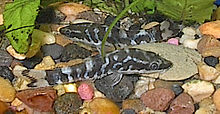Hypoptopomatinae
| Hypoptopomatinae | |
|---|---|

| |
| Otocinclus cocama | |
| Scientific classification | |
| Domain: | Eukaryota |
| Kingdom: | Animalia |
| Phylum: | Chordata |
| Class: | Actinopterygii |
| Order: | Siluriformes |
| Family: | Loricariidae |
| Subfamily: | Hypoptopomatinae C. H. Eigenmann & R. S. Eigenmann, 1890 |
| Genera | |
|
Tribe Hypoptopomatini | |
The Hypoptopomatinae are a subfamily of catfishes (order Siluriformes) of the family Loricariidae,[4] composed of 17 genera and approximately 80 species.[5] This subfamily represents about one-tenth of all loricariid species.[6]
It has been divided into two tribes, Hypoptopomatini and Otothyrini.[4] However, in a 2005 analysis, Otothyrini was found to not be monophyletic, with its representatives comprising a paraphyletic group in relation to the tribe Hypoptopomatini.[7] More recent phylogenetic evidence shows that Hypoptopomatini and Otothyrini, while each are monophyletic tribes, do not form a monophyletic subfamily, and therefore should each be recognized as their own individual subfamilies.[8] Problematically, the most recent hypoptopomatine genera, Gymnotocinclus and Rhinolekos, were not classified in either of the tribes.[3][9]
Almost all species of Hypoptopomatinae have a diploid number of 2n = 54; this group is karyotypically very conserved.[10]
Hypoptopomatinae are distributed east of the Andes in South America from Venezuela to northern Argentina.[5] Most of the hypoptopomatine species are usually found at or near the water surface, typically in close association with riverbank vegetation or some subsurface structure.[11]
References
[edit]- ^ Martins, F.O.; Andrade, B.N.; Rosa, A.C.; Langeani, F. (2014). "Chauliocheilos saxatilis, a new genus and species of Hypoptopomatinae from rio Jequitinhonha basin, with a unique labial appendix (Teleostei: Loricariidae)". Ichthyological Exploration of Freshwaters. 25 (3): 193–204.(Abstract)
- ^ Reis, R.E., Pereira, E.H.L. & Lehmann A., P. (2012): A New Genus and Species of Hypoptopomatine Catfish (Siluriformes: Loricariidae) from the Upper Rio São Francisco Basin, Brazil. Copeia, 2012 (1): 6–11.
- ^ a b de Oliveira Martins, F. & Langeani, F. (2011): Rhinolekos, a new genus with three new species of Hypoptopomatinae (Siluriformes: Loricariidae) from upper rio Paraná. Neotropical Ichthyology, 9 (1): 65-78.
- ^ a b Ribeiro, Alexandre C.; Carvalho, Murilo; Melo, Alex L. A. (2005). "Description and relationships of Otothyropsis marapoama, a new genus and species of Hypoptopomatine catfish (Siluriformes: Loricariidae) from rio Tietê basin, southeastern Brazil". Neotropical Ichthyology. 3 (4): 489–498. doi:10.1590/S1679-62252005000400006. hdl:11449/26922.
- ^ a b Ferreira, Katiane M.; Ribeiro, Alexandre C. (2007). "Corumbataia britskii (Siluriformes: Loricariidae: Hypoptopomatinae) a new species from the upper Rio Paraná basin, Mato Grosso do Sul, Central Brazil" (PDF). Zootaxa. 1386: 59–68. doi:10.11646/zootaxa.1386.1.7.
- ^ Reis, Roberto E.; Schaefer, Scott A. (December 21, 1998). "New Cascudinhos from Southern Brazil: Systematics, Endemism, and Relationships (Siluriformes, Loricariidae, Hypoptopomatinae)" (PDF). American Museum Novitates (3254): 1–25.
- ^ Gauger, Marco F. W.; Buckup, Paulo Andreas (2005). "Two new species of Hypoptopomatinae from the rio Paraíba do Sul basin, with comments on the monophyly of Parotocinclus and the Otothyrini (Siluriformes: Loricariidae)". Neotropical Ichthyology. 3 (4): 509–518. doi:10.1590/S1679-62252005000400008.
- ^ Cramer, Christian A.; Bonatto, Sandro L.; Reis, Roberto E. (2011). "Molecular phylogeny of the Neoplecostominae and Hypoptopomatinae (Siluriformes: Loricariidae) using multiple genes". Molecular Phylogenetics and Evolution. 59 (1): 43–52. doi:10.1016/j.ympev.2011.01.002. PMID 21241812.
- ^ Carvalho, Tiago Pinto; Lehmann A., Pablo; Reis, Roberto E. (2008). "Gymnotocinclus anosteos, a new uniquely-plated genus and species of loricariid catfish (Teleostei: Siluriformes) from the upper rio Tocantins basin, central Brazil". Neotropical Ichthyology. 6 (3): 329–338. doi:10.1590/S1679-62252008000300006.
- ^ Andreata, Artur Antonio; Oliveira, Claudio; Foresti, Fausto (2006). "Karyological characterization of four Neotropical fish species of the genus Hisonotus (Teleostei, Loricariidae, Hypoptopomatinae) from distinct Brazilian river basins" (PDF). Genet. Mol. Biol. 29 (1): 62–66. doi:10.1590/S1415-47572006000100013.
- ^ de Brito, Marcelo F. G.; Caramaschi, Érica P. (2005). "An albino armored catfish Schizolecis guntheri (Siluriformes: Loricariidae) from an Atlantic Forest coastal basin" (PDF). Neotropical Ichthyology. 3 (1): 123–125. doi:10.1590/s1679-62252005000100009.
